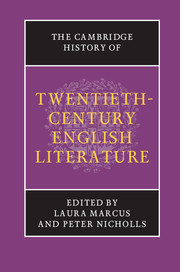Book contents
- Frontmatter
- Introduction
- PART ONE WRITING MODERNITY
- PART TWO THE EMERGING AVANT-GARDE
- PART THREE MODERNISM AND ITS AFTERMATH, 1918–1945
- 10 Trauma and war memory
- 11 The time–mind of the twenties
- 12 Modern life: fiction and satire
- 13 Modernist poetry and poetics
- 14 Modernity and myth
- 15 Psychoanalysis and literature
- 16 Biography and autobiography
- 17 ‘Speed, violence, women, America’: popular fictions
- 18 Theatre and drama between the wars
- 19 Literature and cinema
- 20 The thirties: politics, authority, perspective
- 21 Literary criticism and cultural politics
- 22 Surrealism in England
- 23 World War II: contested Europe
- 24 World War II: the city in ruins
- PART FOUR POST-WAR CULTURES, 1945–1970
- PART FIVE TOWARDS THE MILLENNIUM, 1970–2000
- Bibliography
- Index
23 - World War II: contested Europe
from PART THREE - MODERNISM AND ITS AFTERMATH, 1918–1945
Published online by Cambridge University Press: 28 March 2008
- Frontmatter
- Introduction
- PART ONE WRITING MODERNITY
- PART TWO THE EMERGING AVANT-GARDE
- PART THREE MODERNISM AND ITS AFTERMATH, 1918–1945
- 10 Trauma and war memory
- 11 The time–mind of the twenties
- 12 Modern life: fiction and satire
- 13 Modernist poetry and poetics
- 14 Modernity and myth
- 15 Psychoanalysis and literature
- 16 Biography and autobiography
- 17 ‘Speed, violence, women, America’: popular fictions
- 18 Theatre and drama between the wars
- 19 Literature and cinema
- 20 The thirties: politics, authority, perspective
- 21 Literary criticism and cultural politics
- 22 Surrealism in England
- 23 World War II: contested Europe
- 24 World War II: the city in ruins
- PART FOUR POST-WAR CULTURES, 1945–1970
- PART FIVE TOWARDS THE MILLENNIUM, 1970–2000
- Bibliography
- Index
Summary
Many key texts of the 1930s, written in grim foreknowledge of World War II, mapped Europe as a psycho-political space of Fascist manipulation, shifting borders and doomed voices demanding just representation before the axe fell. Travel writing, written in response to government appeasement policies, particularly after the failure of the Spanish Civil War and the tragedy of Czechoslovakia, became the key trope and genre for reports from the real and imaginary-future front.
In 1945, Evelyn Waugh distinguished between the innocent age of travel writing, the first half of the 1930s, and the political travel accounts of the run-up to the war. Travel had been a journey to the ‘wild lands where man has deserted his post’, or to the ‘soft breezes and mellow sunshine’ of the Mediterranean. But from 1935 onwards, as a war correspondent reporting on Abyssinia, Waugh took on ‘the livery of a new age’, no longer as ‘a free traveller’, but as a recruit in the political battleground over the future of Europe. This shift to the political was also played out in the many committed texts about journeys to the Spanish Civil War, a struggle eclipsing ‘the Spain that dwells in everyone’s imagination’. Its failure initiated a turn inwards in forms and genres of writing which became increasingly psychogeographical, neurotic, mythopoeic.
This shift can be registered even in the orthodox travel accounts that were still being written. Graham Greene’s Journey Without Maps (1936), an account of his journey to Liberia, is ostensibly a text in the old style, exploiting Liberia as screen for the projection of a Western dream of a primitive lost kingdom.
- Type
- Chapter
- Information
- The Cambridge History of Twentieth-Century English Literature , pp. 417 - 435Publisher: Cambridge University PressPrint publication year: 2005

